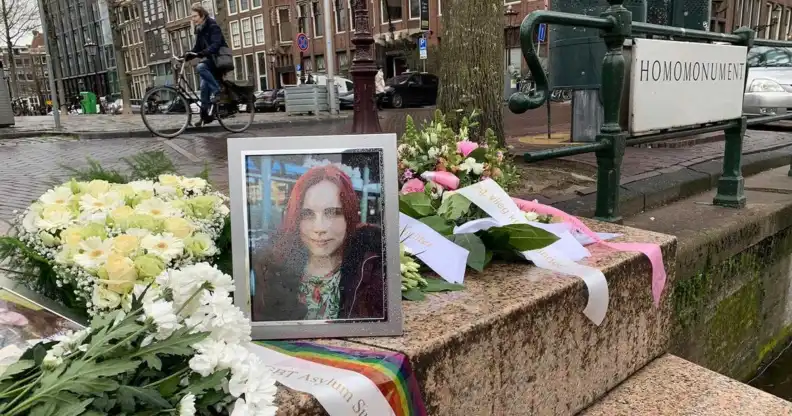Trans woman who fled Russia dies by suicide in Dutch refugee camp

Khina Zakharova took her own life at a refugee camp in February (LGBT Asylum Support on Instagram)
A young Russian trans woman reportedly took her own life in a refugee camp in the Netherlands after fleeing her anti-LGBTQ+ homeland.
Khina Zakharova, 21, died on the evening of 27 February in a refugee camp in the northern Dutch town of Drachten, according to information shared by Dutch LGBT Asylum Support and Fem Antiwar Resistance.
A framed photograph of Zakharova, along with flowers and rainbow sashes, was placed at Homomonument, a memorial in the centre of Amsterdam that commemorates all the LGBTQ+ people who were persecuted during World War II.
Zakharova had reportedly applied for asylum in the Netherlands in December. It’s been suggested that she had trouble accessing hormone therapy and antidepressant medication while in the camp, but reports are conflicting.
According to reports, Zakharova is the second LGBTQ+ refugee to die by suicide in the Netherlands in six weeks.
Her funeral was held on 6 March and was described as “an unreal farewell for many, full of tender memories, emotional speeches”.
One LGBTQ+ activist told Global Voices that queer people coming from Russia, as she did, face high levels of discrimination.
“Most people in Russia are biased towards the LGBTQ+ community, reluctant to understand the pains and struggles of the community,” Maria – not her real name – said.
“In the case of transgender people, this bias directly affects the speed of a person’s social adaptation. Despite the fact that the situation in Europe is generally better, one can often face people who reject them.”
Sharing a photograph of Zakharova, the LGBT Asylum Support group wrote in English: “When words are not enough, how can we express the sense of emptiness you leave behind?
“All your new and close friends… your new chosen family, even for a short time, miss you terribly. We are all intensely sad. But wherever you are now, rest in peace Khina, rest in peace.”
Suicide is preventable. Readers who are affected by the issues raised in this story are encouraged to contact Samaritans on 116 123 (www.samaritans.org), or Mind on 0300 123 3393 (www.mind.org.uk). Readers in the US are encouraged to contact the National Suicide Prevention Line on 1-800-273-8255.

